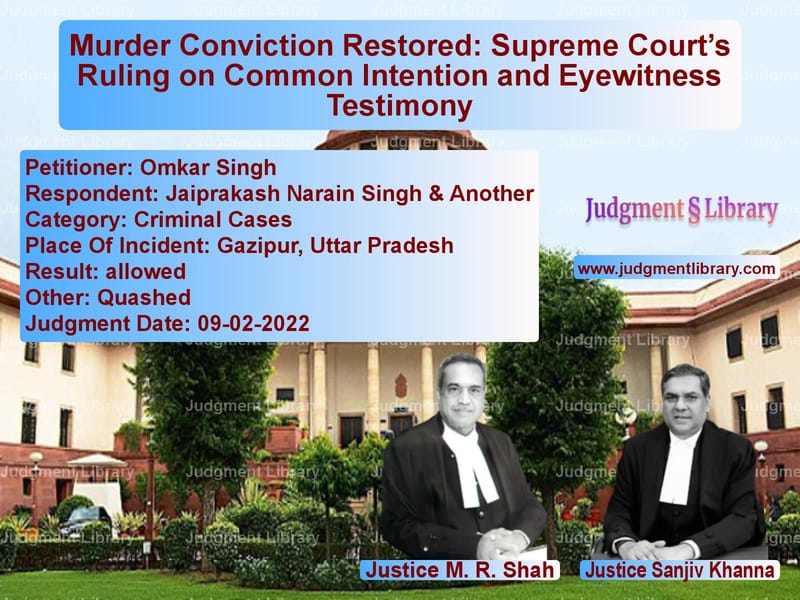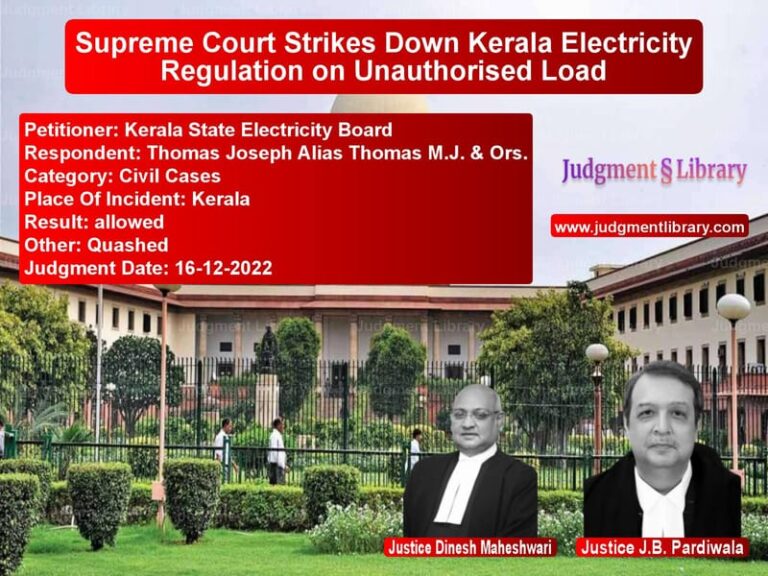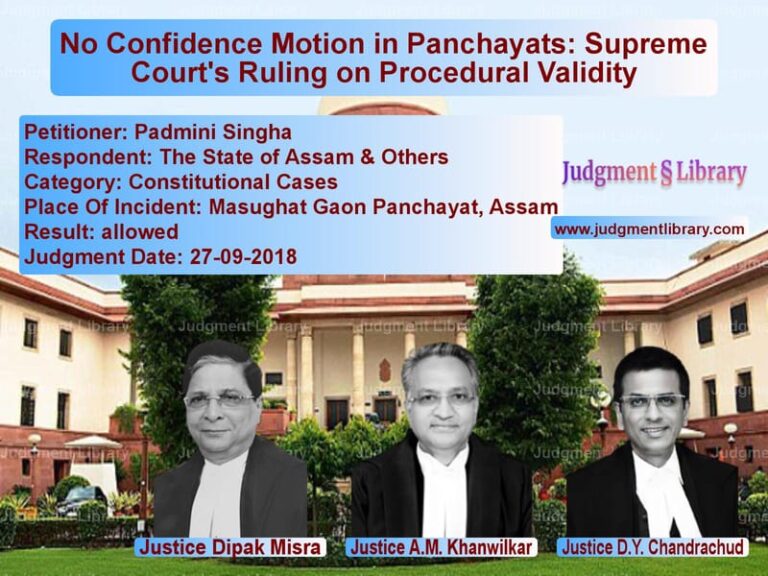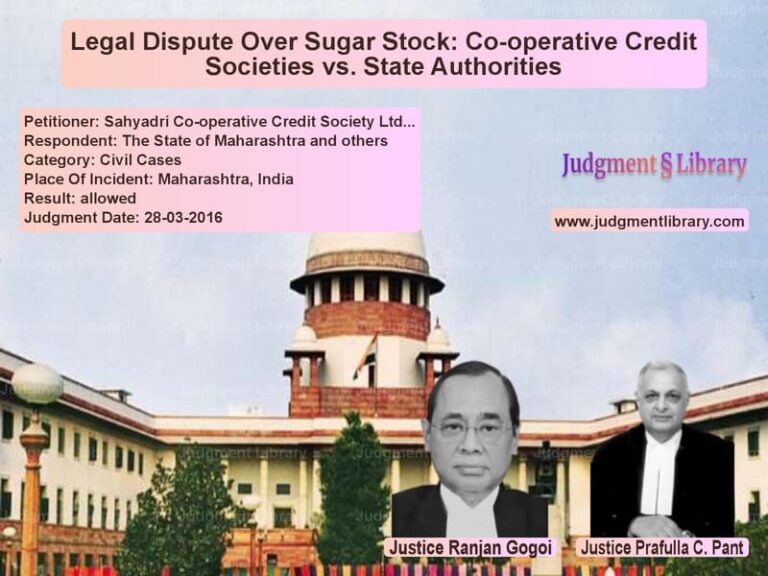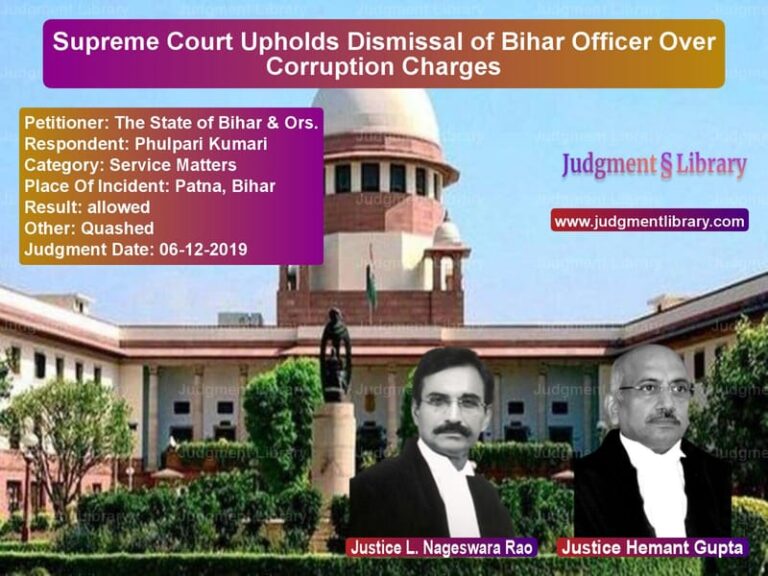Murder Conviction Restored: Supreme Court’s Ruling on Common Intention and Eyewitness Testimony
The case of Omkar Singh vs. Jaiprakash Narain Singh & Another is a landmark ruling concerning the applicability of Section 34 of the Indian Penal Code (IPC) in murder cases. The Supreme Court had to decide whether the acquittal of an accused by the High Court was justified despite clear eyewitness testimony and the presence of common intention in the commission of the crime.
The Supreme Court overturned the High Court’s decision and restored the trial court’s conviction, reaffirming the principle that when multiple accused act in furtherance of a common intention, they are equally liable for the crime.
Background of the Case
The case revolves around the murder of Parasnath Singh on the night of 21st April 1982. The prosecution alleged that the crime was motivated by an ongoing land dispute between the victim’s family and the accused, Jaiprakash Narain Singh (father) and Udaibhan Singh (son). The victim was shot dead at around 2:30–3:00 AM while he was sleeping at his farm.
The FIR was lodged by Omkar Singh, the son of the deceased, who claimed to have witnessed the murder along with two other eyewitnesses. According to the prosecution, Udaibhan Singh fired a shot at the victim at the exhortation of his father, Jaiprakash Narain Singh. The trial court convicted both accused, sentencing them to life imprisonment.
On appeal, the High Court upheld the conviction of Udaibhan Singh but acquitted Jaiprakash Narain Singh, stating that his role was limited to exhortation and that there was a possibility of exaggeration by the witnesses.
Legal Issues Before the Supreme Court
- Was the High Court justified in acquitting the accused merely on the ground that he had only exhorted his son to commit the crime?
- Did the evidence on record establish a clear case of common intention under Section 34 IPC?
- Should the presence of multiple eyewitnesses, who were found to be credible, be disregarded in assessing the accused’s role?
Arguments Before the Supreme Court
Appellant’s Arguments
The appellant, Omkar Singh, represented by his legal counsel, contended:
- The High Court erred in acquitting Jaiprakash Narain Singh despite credible eyewitness testimony from three individuals.
- The accused had a long-standing enmity with the victim, which provided a clear motive for the crime.
- The trial court had correctly convicted both accused based on consistent and corroborated eyewitness accounts.
- Exhortation in a murder case is sufficient to establish common intention under Section 34 IPC, making the accused equally liable for the crime.
Respondent’s Arguments
The defense for Jaiprakash Narain Singh countered:
- The High Court rightly held that his role was limited to exhortation and did not involve any overt act.
- The conviction was based solely on the testimony of related witnesses, whose statements may have been exaggerated.
- There was no independent corroboration to prove that he had a premeditated intention to commit murder.
- At most, his actions could be considered instigation under Section 107 IPC but not sufficient to convict him under Section 34 IPC.
Supreme Court’s Judgment
The Supreme Court set aside the High Court’s acquittal and restored the trial court’s conviction, finding that Jaiprakash Narain Singh acted with common intention to commit murder. The key findings were:
- Eyewitness testimonies from PW-1 (Omkar Singh), PW-2 (Inderdeo Singh), and PW-4 (Vikram Singh) were consistent and reliable.
- The presence of the accused at the crime scene and his direct command to his son to kill the victim established his common intention.
- The High Court’s reasoning that his involvement was an “exaggeration” was unsupported by evidence.
- Under Section 34 IPC, a person who actively encourages or facilitates the commission of a crime shares equal liability for the offense.
The Supreme Court observed:
“The presence of both accused at the scene, coupled with the act of exhortation, establishes that the crime was committed in furtherance of a common intention. The High Court erred in acquitting the second accused based on conjecture rather than evidence.”
Key Observations from the Judgment
- Common Intention: Mere exhortation is sufficient to establish shared intent when it directly facilitates the crime.
- Eyewitness Reliability: Courts must give due weight to consistent testimonies, even if the witnesses are related to the victim.
- Judicial Review of Acquittals: High Court’s findings must be based on legal reasoning, and unwarranted acquittals can be overturned.
- Criminal Liability: All individuals involved in a crime under a shared plan bear equal responsibility under Section 34 IPC.
Impact of the Judgment
This ruling has significant implications for criminal law and the interpretation of common intention:
- For Prosecution: Strengthens the argument that encouragement or instigation can amount to common intention.
- For Defense: Highlights the difficulty in disproving common intention once presence and participation are established.
- For Lower Courts: Reaffirms that mere conjecture cannot form the basis for acquittal when clear evidence is available.
- For Criminal Law: Ensures that co-accused in planned crimes do not escape liability on technical grounds.
Conclusion
The Supreme Court’s decision in Omkar Singh vs. Jaiprakash Narain Singh & Another sets a vital precedent in criminal law by reinforcing the principle of common intention under Section 34 IPC. The ruling clarifies that exhortation can be as culpable as the act itself when it contributes to the commission of a crime.
By restoring the conviction, the judgment underscores the importance of corroborated eyewitness testimony and the need for judicial caution in granting acquittals in serious criminal cases.
Petitioner Name: Omkar Singh.Respondent Name: Jaiprakash Narain Singh & Another.Judgment By: Justice M. R. Shah, Justice Sanjiv Khanna.Place Of Incident: Gazipur, Uttar Pradesh.Judgment Date: 09-02-2022.
Don’t miss out on the full details! Download the complete judgment in PDF format below and gain valuable insights instantly!
Download Judgment: omkar-singh-vs-jaiprakash-narain-si-supreme-court-of-india-judgment-dated-09-02-2022.pdf
Directly Download Judgment: Directly download this Judgment
See all petitions in Murder Cases
See all petitions in Judgment by Mukeshkumar Rasikbhai Shah
See all petitions in Judgment by Sanjiv Khanna
See all petitions in allowed
See all petitions in Quashed
See all petitions in supreme court of India judgments February 2022
See all petitions in 2022 judgments
See all posts in Criminal Cases Category
See all allowed petitions in Criminal Cases Category
See all Dismissed petitions in Criminal Cases Category
See all partially allowed petitions in Criminal Cases Category

